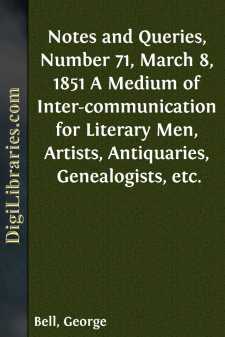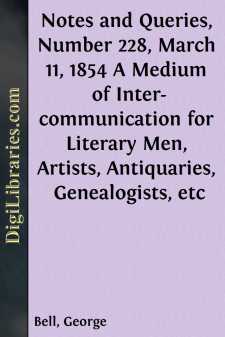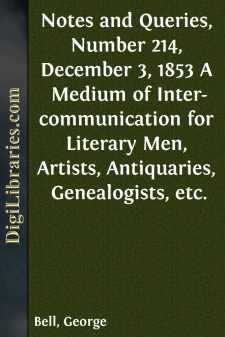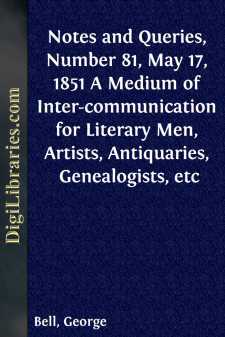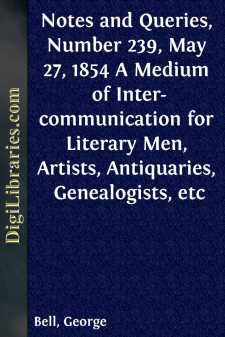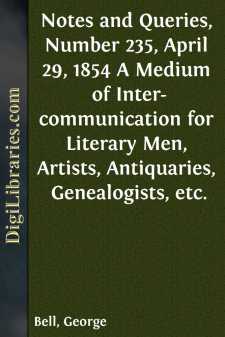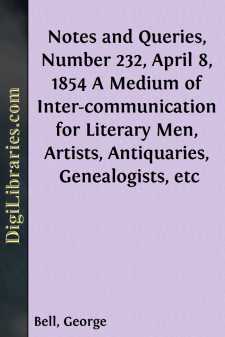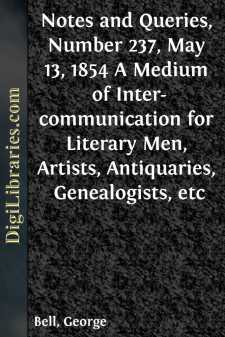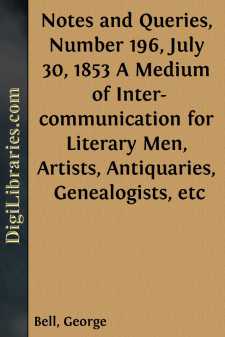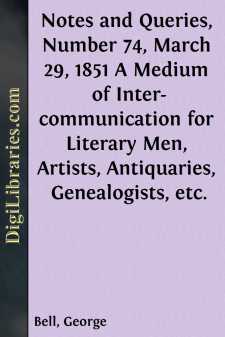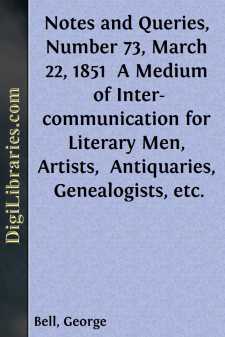Categories
- Antiques & Collectibles 13
- Architecture 36
- Art 48
- Bibles 22
- Biography & Autobiography 813
- Body, Mind & Spirit 142
- Business & Economics 28
- Children's Books 15
- Children's Fiction 12
- Computers 4
- Cooking 94
- Crafts & Hobbies 4
- Drama 346
- Education 46
- Family & Relationships 57
- Fiction 11828
- Games 19
- Gardening 17
- Health & Fitness 34
- History 1377
- House & Home 1
- Humor 147
- Juvenile Fiction 1873
- Juvenile Nonfiction 202
- Language Arts & Disciplines 88
- Law 16
- Literary Collections 686
- Literary Criticism 179
- Mathematics 13
- Medical 41
- Music 40
- Nature 179
- Non-Classifiable 1768
- Performing Arts 7
- Periodicals 1453
- Philosophy 64
- Photography 2
- Poetry 896
- Political Science 203
- Psychology 42
- Reference 154
- Religion 513
- Science 126
- Self-Help 84
- Social Science 81
- Sports & Recreation 34
- Study Aids 3
- Technology & Engineering 59
- Transportation 23
- Travel 463
- True Crime 29
Notes and Queries, Number 71, March 8, 1851 A Medium of Inter-communication for Literary Men, Artists, Antiquaries, Genealogists, etc.
by: George Bell
Categories:
Description:
Excerpt
ON TWO PASSAGES IN "ALL'S WELL THAT ENDS WELL."
Among the few passages in Shakspeare upon which little light has been thrown, after all that has been written about them, are the following in Act. IV. Sc. 2. of All's Well that Ends Well, where Bertram is persuading Diana to yield to his desires:
"Bert. I pr'ythee, do not strive against my vows:
I was compell'd to her; but I love thee
By love's own sweet constraint, and will for ever
Do thee all rights of service.
Dia. Ay, so you serve us,
Till we serve you: but when you have our roses,
You barely leave our thorns to prick ourselves,
And mock us with our bareness.
Bert. How have I sworn?
Dia. 'Tis not the many oaths that make the truth;
But the plain single vow, that is vow'd true.
What is not holy, that we swear not by,
But take the Highest to witness: Then, pray you, tell me,
If I should swear by Jove's great attributes,
I love'd you dearly, would you believe my oaths,
When I did love you ill? this has no holding,
To swear by him whom I protest to love,
That I will work against him."
Read—"when I protest to Love."
It is evident that Diana refers to Bertram's double vows, his marriage vow, and the subsequent vow or protest he had made not to keep it. "If I should swear by Jove I loved you dearly, would you believe my oath when I loved you ill? This has no consistency, to swear by Jove, when secretly I protest to Love that I will work against him (i.e. against the oath I have taken to Jove)."
Bertram had sworn by the Highest to love his wife; in his letter to his mother he says:
"I have wedded her, not bedded her, and sworn to make the not eternal:"
he secretly protests to Love to work against his sacred oath; and in his following speech he says:
"Be not so cruel-holy, Love is holy."
He had before said:
"——do not strive against my vows:
I was compell'd to her; but I love thee
By Love's own sweet constraint:"
clearly indicating that this must be the true sense of the passage. By printing when for whom, and Love with a capital letter, to indicate the personification, all is made clear.
After further argument from Bertram, Diana answers:
"I see that men make ropes in such a scarre
That we'll forsake ourselves."
This Rowe altered to "make hopes in such affairs," and Malone to "make hopes in such a scene." Others, and among them Mr. Knight and Mr. Collier, retain the old reading, and vainly endeavour to give it a meaning, understanding the word scarre to signify a rock or cliff, with which it has nothing to do in this passage. There can be no doubt that "make ropes" is a misprint for "make hopes," which is evidently required by the context, "that we'll forsake ourselves." It then only remains to show what is meant by a scarre, which signifies here anything that causes surprise or alarm; what we should now write a scare. Shakspeare has used the same orthography, scarr'd, i.e. scared, in Coriolanus and in Winter's Tale. There is also abundant evidence that this was its old orthography, indicative of the broad sound the word then had, and which it still retains in the north....


